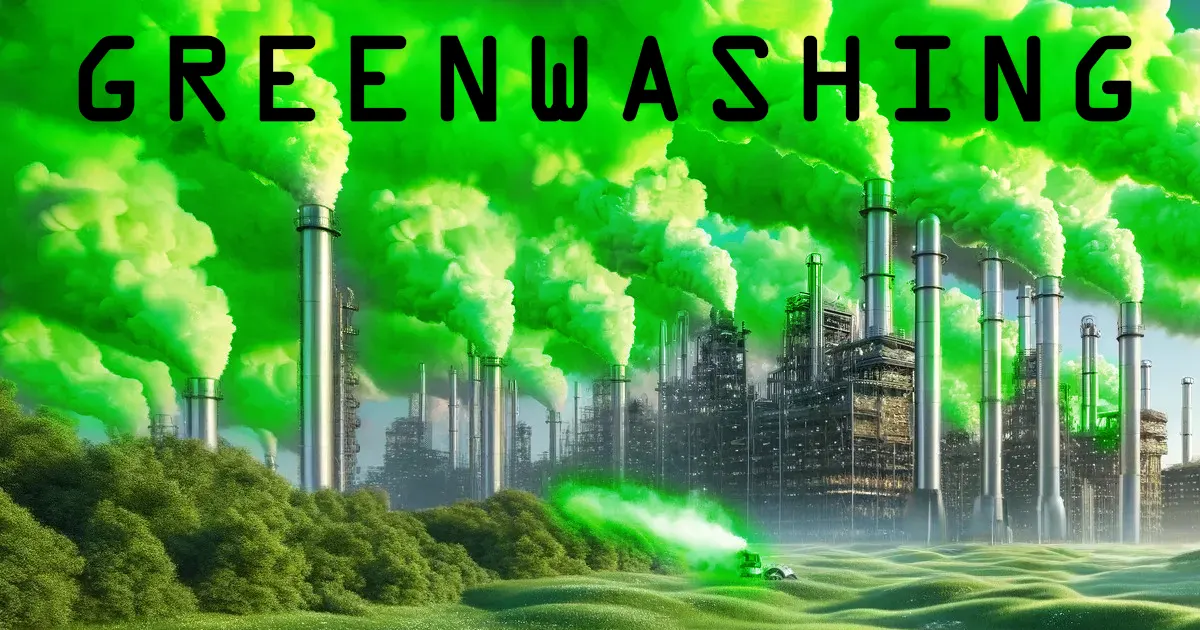GS 3 – Environment

Greenwashing refers to the practice where companies or organizations falsely claim or exaggerate their products, policies, or practices to appear environmentally friendly when, in reality, they are not. Greenwashing is a deceptive marketing practice used to mislead consumers about the environmental benefits of a product or service. The term was coined in the 1980s by environmentalist Jay Westerveld.
Why Greenwashing Occurs
- Consumer Demand for Sustainability:
- Growing preference for eco-friendly products creates an incentive for companies to market themselves as “green.”
- Regulatory Pressure:
- To comply with environmental norms and regulations, companies sometimes engage in false claims.
- Competitive Advantage:
- “Green” branding can give companies an edge in the market.
Forms of Greenwashing
- Vague Language:
- Using ambiguous terms like eco-friendly, natural, or green without clear verification.
- Hidden Trade-offs:
- Highlighting one “green” attribute while ignoring other harmful practices (e.g., recyclable packaging but high carbon footprint production).
- Irrelevant Claims:
- Claiming eco-friendliness for a product that is already regulated (e.g., CFC-free products when CFCs are banned).
- False Labels or Certifications:
- Misusing or creating fake environmental certifications.
- Lack of Proof:
- Failing to provide evidence to support eco-friendly claims.
- Outright Lies:
- Falsely claiming a product is sustainable or meets green standards.
Examples of Greenwashing
- Volkswagen Diesel Scandal (2015):
- Volkswagen claimed their cars were low-emission, but they were found to manipulate emission tests.
- Fast Fashion Brands:
- Some brands claim to use “sustainable materials” but continue unsustainable production practices.
- Plastic Bottles:
- Brands highlight “recyclable” bottles but fail to address overall plastic pollution.
Impacts of Greenwashing
- Misleads Consumers:
- Creates false perceptions about a product’s environmental impact.
- Undermines Genuine Efforts:
- Hurts companies that genuinely invest in sustainable practices.
- Slows Environmental Progress:
- Distracts from real solutions to environmental challenges.
- Loss of Consumer Trust:
- Damages corporate credibility and consumer confidence.
- Environmental Harm:
- Encourages unsustainable consumption patterns.
Measures to Prevent Greenwashing
- Stricter Regulations:
- Implement stringent environmental standards and penalties for false claims.
- Third-Party Certification:
- Independent agencies should verify and certify sustainability claims.
- Consumer Awareness:
- Educating consumers to identify and question greenwashing practices.
- Transparency and Accountability:
- Companies must disclose their environmental impact data.
- Global Standards:
- Adoption of global benchmarks for sustainability reporting like ESG (Environmental, Social, and Governance) frameworks.
Government Initiatives
- Environmental, Social, and Governance (ESG) Regulations:
- SEBI mandates listed companies in India to disclose their ESG performance.
- Bureau of Indian Standards (BIS):
- Ensures proper eco-labeling through certifications like the Eco-Mark scheme.
- Plastic Waste Management Rules, 2016:
- Encourages Extended Producer Responsibility (EPR) to minimize plastic waste.
- Energy Efficiency Programs:
- Schemes like the Perform, Achieve, and Trade (PAT) and the BEE Star Rating promote genuine sustainability.
Way Forward
- Stronger Regulatory Frameworks:
- Governments must introduce penalties for greenwashing and ensure transparency.
- Ethical Corporate Behavior:
- Companies must focus on actual sustainability instead of misleading marketing.
- Technology and Monitoring:
- Use advanced tools to track environmental compliance and report false claims.
- Consumer Empowerment:
- Empower consumers to demand clear, verified, and genuine sustainability data.
Greenwashing undermines global efforts to achieve sustainability and misguides consumers. Combating it requires stringent regulations, consumer awareness, and corporate accountability to ensure genuine progress toward a greener future.




